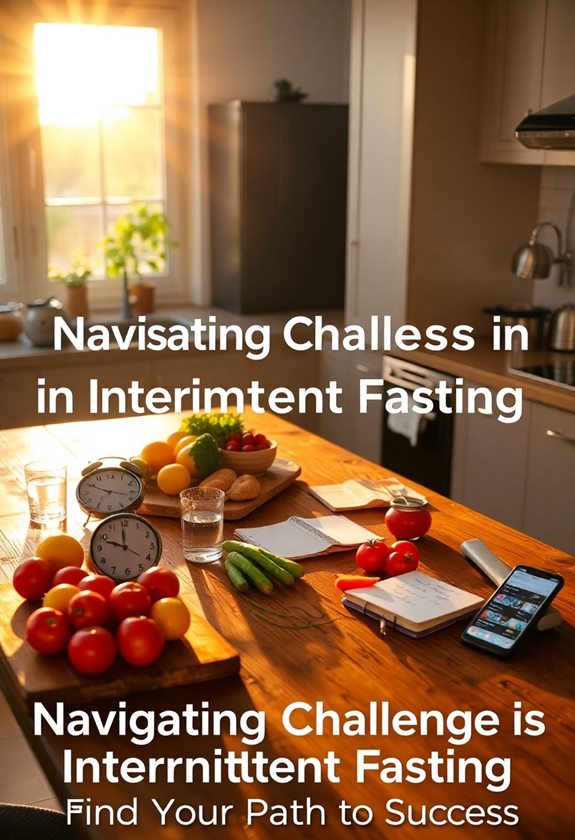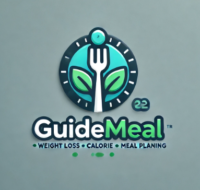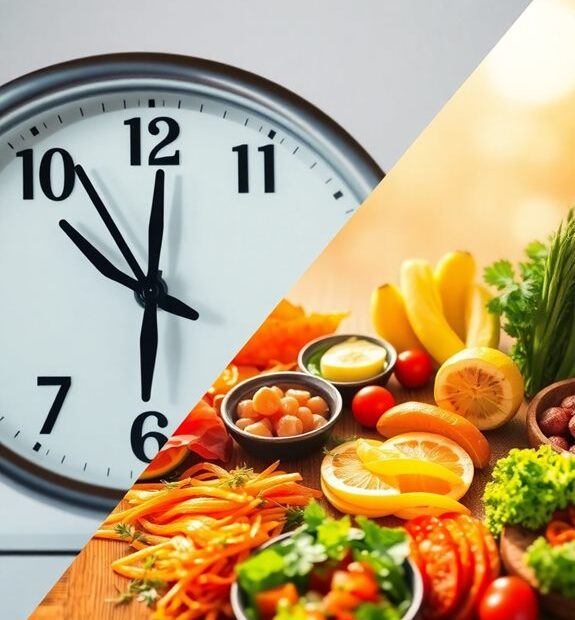Intermittent fasting is a powerful tool for weight loss because it shifts your focus from what you eat to when you eat. By following a method like the 16/8 plan, you fast for 16 hours and eat during an 8-hour window. This helps your body burn fat more effectively. 🌟 Are you tired of constant hunger? Staying hydrated with water or herbal tea can ease cravings. Plus, planning your meals means you'll eat healthy. It's all about listening to your body and being flexible. Want to know how to overcome common challenges? There's more to discover!
Key Takeaways
- Intermittent fasting enhances fat burning efficiency, making it a potent tool for weight loss.
- The 16/8 method allows for effective calorie control by limiting eating hours.
- Fasting periods encourage the body to transition from glucose to fat for energy.
- Improved metabolism from intermittent fasting can lead to sustained weight loss.
- Staying hydrated during fasting helps manage hunger and maintain energy levels.
What Is Intermittent Fasting?

Intermittent fasting (IF) is an eating pattern that cycles between periods of eating and fasting. You might be wondering, "How does that work?" Well, instead of focusing on what you eat, you concentrate on when you eat. This can be as simple as skipping breakfast and only eating between noon and 8 PM. By incorporating strategies like meal planning, you can enhance your intermittent fasting experience and support your weight loss journey.
Many people choose different schedules, like the 16/8 method, where you fast for 16 hours and eat within an 8-hour window. Sounds doable, right? You can still enjoy your favorite meals during that eating window.
During fasting, your body shifts its energy source from glucose to fat, which can be a game-changer for weight loss. It's important to stay hydrated, so drink plenty of water or herbal teas.
You might think, "Is this for me?" It could be if you're looking for a flexible way to manage your weight. Just remember, it's not about starving yourself but rather about timing your meals.
Whether you're curious or ready to try, intermittent fasting can offer a new approach to eating. Are you ready to explore this eating pattern?
Benefits of Intermittent Fasting
When you embrace intermittent fasting, you may experience a variety of benefits that extend beyond weight loss. It's not just about shedding pounds; it's about feeling better overall. You might find that your energy levels increase, making it easier to tackle your day. This approach can also enhance your awareness of nutritional choices, similar to the importance of meal planning. Have you ever noticed how a clear mind helps you focus? Intermittent fasting can enhance your mental clarity, too.
Here are a few key benefits you might enjoy:
- Improved Metabolism: Your body learns to burn fat more efficiently.
- Better Heart Health: Fasting can lower cholesterol and blood pressure, reducing the risk of heart disease.
- Increased Longevity: Some studies suggest that intermittent fasting may help you live longer by promoting cellular repair.
With these benefits, it's clear that intermittent fasting can be a game-changer for your health. Have you thought about how it could fit into your lifestyle? By making simple changes, you can access these advantages and feel your best. So, why not give it a try? You may discover a happier, healthier you!
Popular Intermittent Fasting Methods

Exploring different fasting methods can help you find the best fit for your lifestyle and goals. With so many options available, it's simpler than ever to choose a method that works for you. Have you reflected on how each method can impact your daily routine? Here are a few popular methods to evaluate:
| Fasting Method | Description |
|---|---|
| 16/8 Method | Fast for 16 hours, eat in 8 hours. |
| 5:2 Diet | Eat normally for 5 days, limit to 500-600 calories for 2 days. |
| Eat-Stop-Eat | 24-hour fast once or twice a week. |
| Alternate Day | Fast every other day, eating normally on non-fasting days. |
Which method do you believe would fit into your life? Each one has its own benefits and challenges. For instance, the 16/8 method is popular because it can easily blend into your everyday schedule. Remember, it's crucial to listen to your body and make adjustments as you go. Finding the right method can make your fasting journey enjoyable and effective! 🌟 What's most important to you in choosing a method?
Tips for Successful Fasting
Choosing the right intermittent fasting method is just the beginning of your journey. To make your fasting experience successful, you'll want to set yourself up for success. Remember, it's not just about what you eat, but also how you approach your fasting periods. Integrating proper nutrition into your eating windows can notably enhance your fasting results, as the synergy of nutrition and physical activity plays a vital role in achieving weight loss goals.
Here are some tips to help you thrive:
- Stay Hydrated: Drinking water, herbal tea, or black coffee keeps you full and energized. Have you tried flavored water for a revitalizing twist? 💧
- Plan Your Meals: Prepare healthy meals for your eating window. This makes it easier to resist junk food when hunger strikes. What's your favorite quick and healthy recipe? 🍽️
- Listen to Your Body: If you feel weak or dizzy, it's okay to adjust your fasting schedule. Are you in tune with your body's needs?
Potential Challenges and Solutions

Intermittent fasting can be a powerful tool for weight loss, but it's not without its challenges. You might feel hungry or cranky during fasting periods, which is totally normal. Have you ever found it hard to ignore those hunger pangs? Instead of giving in, try drinking water or herbal tea to help curb your appetite.
Another challenge is social situations. What do you do when friends invite you out for dinner? You can plan ahead by choosing a restaurant with healthy options or eating a light snack before you go. This way, you won't feel tempted to overindulge.
You may also struggle with energy levels, especially when you first start. Remember, your body needs time to adjust. If you feel tired, consider easing into fasting by starting with shorter windows and gradually increasing them.

